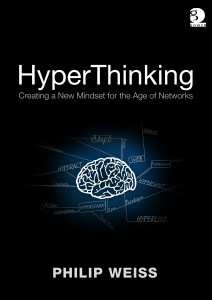 Philip Weiss. Hyperthinking: Creating a New Mindset for the Age of Networks. Burlington, VT: Gower Publishing, 2012.
Philip Weiss. Hyperthinking: Creating a New Mindset for the Age of Networks. Burlington, VT: Gower Publishing, 2012.
In the world of integral leadership we read a lot about developing worldviews, values, consciousness and the like. Often cognitive development is assumed. In this small volume we find a presentation of an approach to thinking this is useful for changing life conditions in which networks of relationships are becoming more and more complex. Shifting perspectives, an idea very much supported by integral theory, is a requirement for appreciating the dynamics of change. Also, appreciating the role that our words have in shaping our perceptions and the meaning we draw from them is central to the dynamic of paradigms and change.
The author states,
…combining the notion of continual paradigm shifts with an understanding of perspectivism can offer us the best approach for coping with an ever-changing reality…
Perspective shifting in integral theory is often focused on ways to make sense and meaning of a phenomenon, occurrence or an aspect (internal, external…). Developing perspective shifting skills is highly relevant to being and doing in the world. It is essential for avoiding “black swan” approaches as highlighted in the work of Nassim Nicholas Taleb (The Black Swan: The Impact of the Highly Improbable).
Weiss posits four dimensions of hyperthinking:
- Hypershifting – understanding the paradigms we hold and learning to alter our perceptions.
- Hyperlearning – honing our mental skills through ongoing learning and experimentation.
- Hyperlinking – using new technologies in every aspect of our lives, thereby expanding our reach and impact.
- Hyperacting – an ironic term for attending to execution and creativity related to new technologies. “It is the ability to conceive, prototype and test ideas to determine their usefulness.”
A final highlight of this work is the author’s focus on the need for collaboration:
Putting these radical new ideas into practice will be a challenge, especially for those working in conservative or risk-averse organizations. This is why hyperthinkers need to find new was to collaborate, share ideas and spread their values. In addition to guiding our development as hyperthinkers, Weiss offers advice on such collaboration. The importance of collaboration cannot be over-emphasized. The complexity of challenges in the world increasingly call for transdisciplinary approaches. Transdisciplinary research, innovation and execution require collaboration. Indeed, one of the greatest inhibitors to such collaboration includes issues raised in the the early and continuing work on group dynamics with its focus on what supports and inhibits collaboration. This is further proof that as we develop and innovate our approaches to challenge and change, including our own skills and capabilities, we still need to pay attention to what we have learned in the past. It does not go away in importance. Rather it feeds our evolution.
